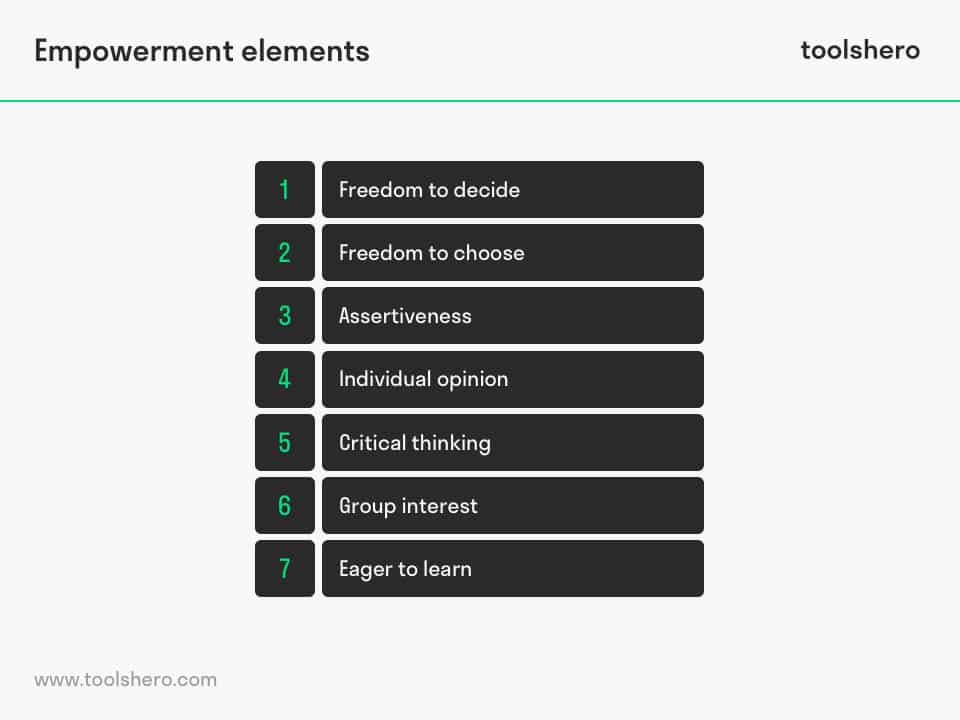Empowerment: Definition and Basics

Empowerment is a process of awareness that is about activating people to use their own strengths. It’s a self-awareness tool. This article describes empowerment in a practical way. After reading you will understand the definition and basics of this powerful leadership and management concept. Other highlights are: the benefits of empowerment, the important elements and how to use it as a management tool. Finally, this article also discusses the use of a Personal Development Plan.
What is empowerment?
Each organisation is driven by its employees. That means it’s important to motivate all employees and raise them to a higher level. Empowerment aims at making employees function as optimally as possible by giving them independence.
American psychiatrist Judi Chamberlin wrote an article about empowerment in 1998.
With regard to organisations however, empowering is different from delegating. It’s about motivating personnel to make them more powerful, enabling them to get even more quality out of their activities.
This will improve overall productivity and increase mutual trust, engagement and loyalty of the employees, while giving them the chance to develop.
Empowerment and management development
Empowerment is a process of awareness that is about activating people to use their own strengths. As mentioned, it’s a self-awareness tool. An important aspect of it is management development, which focuses on correctly filling internal vacancies. It encourages employees to learn on the job.
This guides them to be independent, to perform better and to find solutions together. Their experience enables them to grow and support other co-workers.
Empowerment as a management tool
The definition of empowerment
Empowerment is a management tool that employers use to enable employees to develop themselves. On the one hand, it focuses on discovering and employing the talents of employees.
On the other hand, it focuses on stimulating employees to grow. Every position within an organisation requires specific competencies. Empowering employees is about bringing their specific talents to the surface and using that talent at different departments.
This will increase employee performance. It’s important that organisations are aware that they have to support their employees in this respect and encourage them to develop themselves.
Leadership Masterclass – Insights, Models and Application
Benefits of empowerment
Empowerment has many benefits. Both for the individual employee and the manager, as well as the organisation as a whole. Employees who are empowered understand that they have the ability to change their attitude. They control it.
Empowered employees are confident and approach others feeling good and relaxed, regardless of whether they’re a co-worker or a superior. They believe in themselves and won’t let others around them intimidate or discourage them. They believe in equality and won’t allow others or themselves to show dominance.
As employees, they have excellent problem-solving skills; they’re willing to take risks and try to arrive at a workable solution step by step. They are also able to come to good and clear agreements and actually honour these.
Furthermore, empowering employees increases a manager’s scope of control. Managers won’t have to worry about their employees as much nor give them as much guidance, as they are perfectly able to work independently and to take responsibility.
Important elements of empowerment
Empowerment believes in people’s personal strength that allows them to take control of their own lives. According to Chamberlin, it’s composed of various elements. We’ve made a list below of the most important ones that primarily apply to employees.

Figure 1: Overview of empowerment elements.
Freedom to decide
It gives employees a lot of independence when they’re allowed to make their own decisions, for instance about the tasks they perform and the time in which something has to be completed. It makes them better able to keep their promises, and they experience more joy in their work.
Freedom to choose
This also grants independence, and it’s worth noting that it can even help employees make the right choice.
Assertiveness
By clearly standing up for themselves while also respecting others and expressing their own wishes and expectations, employees will be able to achieve what they want.
Individual opinion
Empowering employees enables them to express their opinions and to really listen to others.
Critical thinking
Critical thinking: by acting in ways that are not conditioned and instead also looking at things from different perspectives, employees are more aware of their own actions and those of others.
Group interest
Empowering employees isn’t just about the individual; it’s also about being connected with others. This is a particularly important aspect in a team context.
Eager to learn
Without being open to new methods, approaches and ideas, an individual can’t grow.
Personal Development Plan (PDP)
Empowerment is mainly achieved by giving employees the opportunity to improve themselves with challenges, through training or by expanding their responsibilities. By frequently holding individual meetings with all employees, an organisation can learn about their needs and wishes. Everything that has been agreed on can be recorded in a Personal Development Plan, the so-called PDP.
It’s important that the manager acts as a coach in this respect. When the manager adds any pressure from above, empowering employees becomes impossible. The idea is that meetings take place as equals, giving the employee the initiative.
They will have to put forward ideas to increase their knowledge and skills. That’s the only way in which they’ll be motivated enough to take the plunge and work towards the final goal. The manager monitors, stimulates and motivates that journey.
Summary empowerment
Giving empowerment to employees in businesses involves delegating decision-making authority to employees and allowing them to take ownership of their work.
This approach can lead to higher employee engagement, job satisfaction, and productivity, as well as better organizational performance.
Empowered employees are more likely to feel valued, motivated, and committed to achieving company goals. However, giving empowerment requires trust and effective communication between managers and employees, as well as a supportive organizational culture that fosters creativity, innovation, and continuous learning.
Now It’s Your Turn
What do you think? Do you recognize this practical explanation or do you have more additions? Is empowerment something that is applied within your organisation? What are your experiences with empowering employees? Do you empower individuals?
Share your experience and knowledge in the comments box below.
More information
- Chamberlin, J., & Schene, A. H. (1997). A working definition of empowerment. Psychiatric rehabilitation journal, 20, 43-46.
- Chen, G., Kirkman, B. L., Kanfer, R., Allen, D., & Rosen, B. (2007). A multilevel study of leadership, empowerment, and performance in teams. Journal of applied psychology, 92(2), 331.
- Kark, R., Shamir, B., & Chen, G. (2003). The two faces of transformational leadership: Empowerment and dependency. Journal of applied psychology, 88(2), 246.
- Karve, S. (2023). Leadership Masterclass – Insights, Models and Application. Retrieved 07/02/2024 from Udemy.
How to cite this article:
Mulder, P. (2019). Empowerment. Retrieved [insert date] from Toolshero: https://www.toolshero.com/management/empowerment/
Original publication date: 06/20/2019 | Last update: 02/09/2024
Add a link to this page on your website:
<a href=”https://www.toolshero.com/management/empowerment/”> Toolshero: Empowerment</a>












